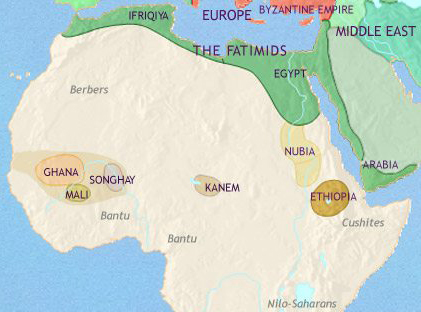970
Mighty empires are firmly established in Africa north of the Equator. The Bantu peoples are migrating to the south. Trade routes link the empires – Ghana, Mali and Songhay in West Africa; Ethiopia and Nubia in East Africa; and Kanem in Central Africa. However, this year another mighty dynasty emerges when Moez-ladin-Allah establishes control over the entire Mediterranean Coast of North Africa. Ruling from Cairo, the Fatimids (Egyptian caliphs) will take possession of Palestine and Syria, and an African power will rule over the Middle East for the next century.
























